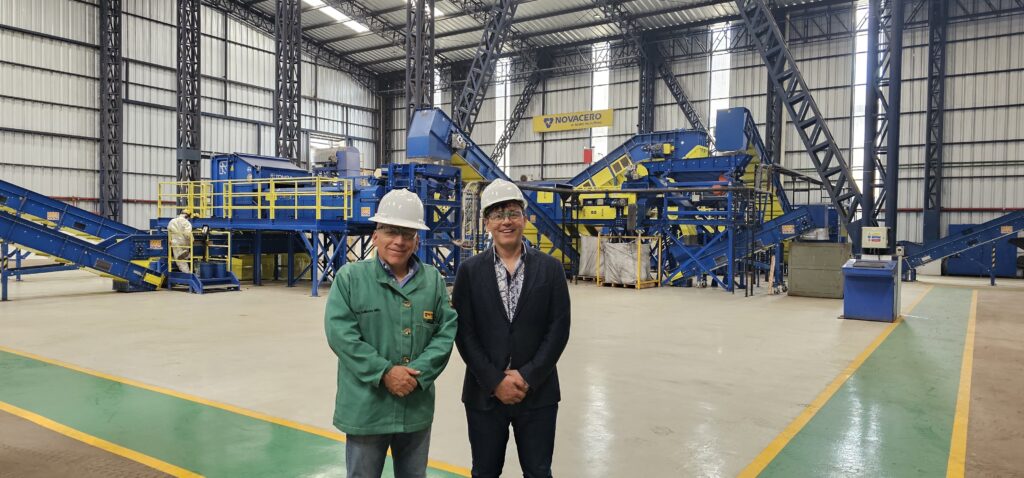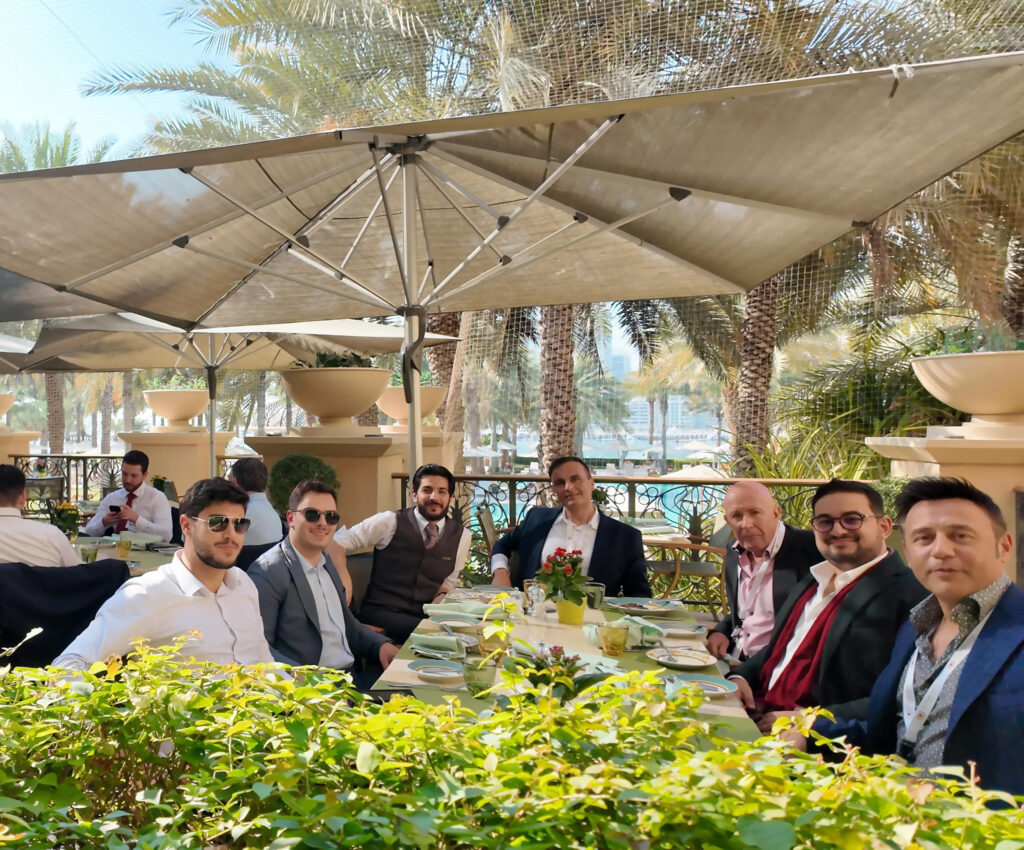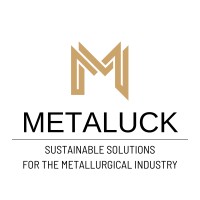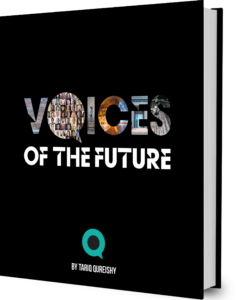Alexander Alegria-Seif stands at the crossroads of passion, purpose, and impact, embodying what it means to dream and act with intention. “I’m an impact investor and passionate about creating impact in the world,” he states, heralding a dialogue transcending the mundane. As friends and Harvard Business School alums, our connection runs deep, revealing Alex as more than an entrepreneur: he is a visionary shaping a legacy for now and the future.
With two decades in the metal recycling sector, Alex helms Fvutra, empower networks and Business Communities through digital infrastructure, technologies and frameworks to express their optimal efficiency, effectiveness and economic potential while fostering environmental stewardship and social impact. He’s dedicated to uplifting initiatives tackling climate change, social inequality, and environmental degredation, leveraging his prowess in system change and strategy for global wellbeing and ecological renewal. Fvutra stands as a collective aiming to create a world where conscious transformation of business communities become the pillars to live with nature in harmony and joy.
Leading Metaluck, Alex is at the forefront of promoting sustainability by making the circular innovation the corenerstone of global wellbeing. His vision steers towards redefining economic practices to prioritize People, Planet before Profit, crafting supply chains that are ethical and beneficial for communities and the broader business landscape.
I’m curious about what ignited Alex’s passion. He recalls a pivotal interview with his father in 2014 during his time at Harvard Business School, an experience he describes as uncommon: “It’s not usual that you interview your dad.” This interview, part of the Authentic Leadership program, revealed the foundational values of ethics, integrity, and service that drive him. Alex shares: “I discovered that a lot of who I am today comes from that background of ethicality, integrity, and service to others.” He further stresses, “Resilience and adherence to your principles are crucial,” underscoring his father’s influence on his approach to overcoming challenges and finding his true north.
Alex’s journey from the metal industry to impact investing was unplanned, ignited by the revelation of industrial waste’s potential during his early work with aluminum. “It was an eye-opener,” he says of his initial foray into metal recycling in Egypt in 2001, viewing himself merely as an adventurous businessman, not yet focused on impact.
His fundamental transformation occurred in 2011 during a spiritual retreat in Bali. A conversation with his mentor, Janur, about the illusionary goals of life, guided by the Hindu concept of Maya – “Maya suggests we exist within a realm of illusion, where our beliefs shape our reality” – shifted Alex’s path. This dialogue redefined his career towards purpose driven business, blending his business acumen with a deeper, value-driven mission.

Venturing into metal recycling decades ago, a field then lacking allure, my perception shifted only recently, recognizing its vital role in sustainability and the circular economy. Alex’s knack for seeing value in overlooked waste led to innovative recycling methods. “I asked myself why this thing was sitting there; there was somebody who would be able to utilize it,” he muses. His curiosity drove him to repurpose 1 million tons of industrial waste from the steel industry in Latin America, embodying his solution-focused ethos. “Driven by a constant urge to find solutions, I have always focused on carving out a niche for myself,” he states, underlining his proactive approach to waste.
The concept of the ‘circular economy’ captivates me, especially as Alex elaborates on its departure from linear consumption to a sustainable cycle of recycling, reusing, and repurposing materials. “The circular economy involves the recycling, reuse, and repurposing of materials,” he shares, contrasting it with the traditional extractive and linear economic models that cycle through mining, production, and disposal. “In the circular economy, this linear cycle is disrupted; it’s more of a closed loop,” he explains. “Our core mission is to spearhead circular innovation for global well-being,” Alex asserts. “We’re constantly strategizing on sustainable solutions.”
The relentless push for newer gadgets, a hallmark of hyper-capitalism, contrasts starkly with a past where appliances lasted decades. Alex and I agree that this cycle of constant consumption significantly burdens our planet. Alex argues for a capitalism makeover to focus on people and the planet’s welfare, questioning the consumptiondriven GDP model. “It starts by understanding that there is a new way to reimagine capitalism,” he states. “Financial assets also are growing rapidly, fueled by this extractive economy,” he highlights.
Amid global discussions on sustainability, I question if a paradigm shift towards a holistic growth model – encompassing people, planet,
purpose, prosperity, and peace – is achievable. Alex stresses the necessity of hope and strategic action for humanity’s survival, criticizing the outdated belief that corporations owe allegiance solely to shareholders. With the emerging focus on SDGs principles, he challenges the prioritization of profit over global well-being. Through his company, Metaluck, Alex exemplifies “steward ownership,” advocating for a business model that equally values economic contributions and decision-making rights, potentially transforming conventional business norms.
In 2024, Dubai hosted COP 28, and 2025’s event will be in Azerbaijan – both major oil-producing nations. The presence of oil and financial executives highlighted the event’s commercial undertones. It leads me to ponder the genuine impact of environmental initiatives against the backdrop of the oil industry’s vast assets. With companies holding about five trillion dollars in oil reserves, the commitment to environmental sustainability often feels more like lip service than a genuine effort for change. The question of how significant these efforts are remains challenging.

Alex highlights the issue of greenwashing, exemplified by companies like Shell offloading polluting assets to feign ESG compliance, a tactic that skirts the problem instead of addressing it. “They are making enormous profits, and they don’t care because they’re not publicly listed and are not under scrutiny,” he observes.
In discussing sustainability, I highlight that “green is the new digital,” pushing for sustainability to become as integral as digital technology. Alex reinforces this, emphasizing the importance of intentionality in impact investing. “Having sustainability as part of your values; it’s part of your intentionality,” he states, indicating that genuine change requires motivation for rewards and urgency to preven unsustainable practices.
Addressing the profitability of sustainability, Alex outlines two perspectives: proving the financial benefits of sustainable investments and recognizing sustainability as a moral imperative. He challenges the profit-centric mindset in the face of environmental and societal challenges, advocating for sustainability as a foundational element in business for enduring success and ethical profit generation.
Furthermore, as digitization accelerates, making processes quicker and cheaper, Alex values the irreplaceable worth of human qualities like empathy and critical thinking. Committed to being the change he envisions, Alex focuses on personal and spiritual development as foundational to influencing broader societal shifts. “I always look at myself; I want to be the change I want to see in the world,” he declares.
He champions a fundamental shift in industry norms, stating, “If you change everything and you don’t change the values, beliefs, and culture, you are building something that has no foundation.”
As we ponder Alex’s 100th birthday, he imagines celebrating not material wealth but the journey to Ithaca, a metaphor for life’s rich experiences. “I’m not a seeker of legacy; the only journey worth taking is that inner journey,” he reveals, focusing on contributing positively to humanity daily.
Alex’s story is more than success; it’s a blueprint for future generations to champion impactful investments, ventures and lead with enduring vision. His philosophy invites us to envision a future where ambition aligns with altruism, urging us to craft a legacy of meaningful progress.

“If you change everything and you don’t change the values, beliefs, and culture, you are building something that has no foundation.”













